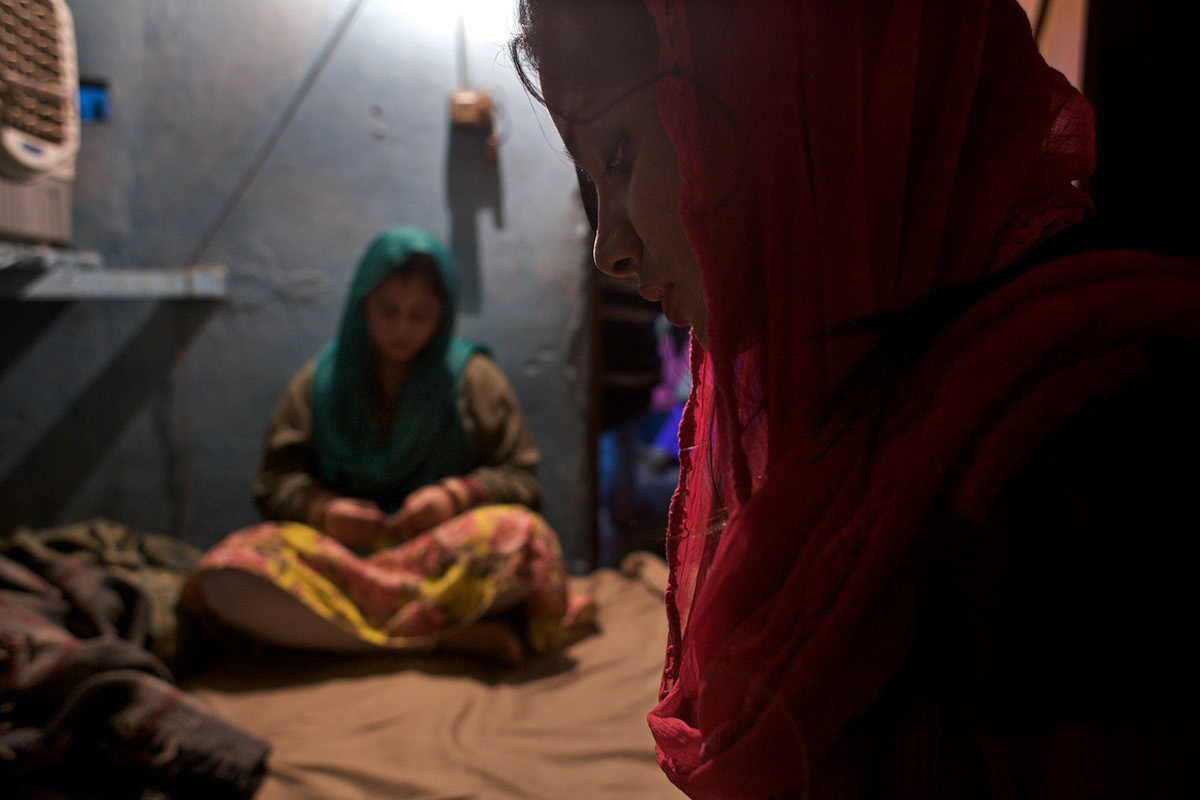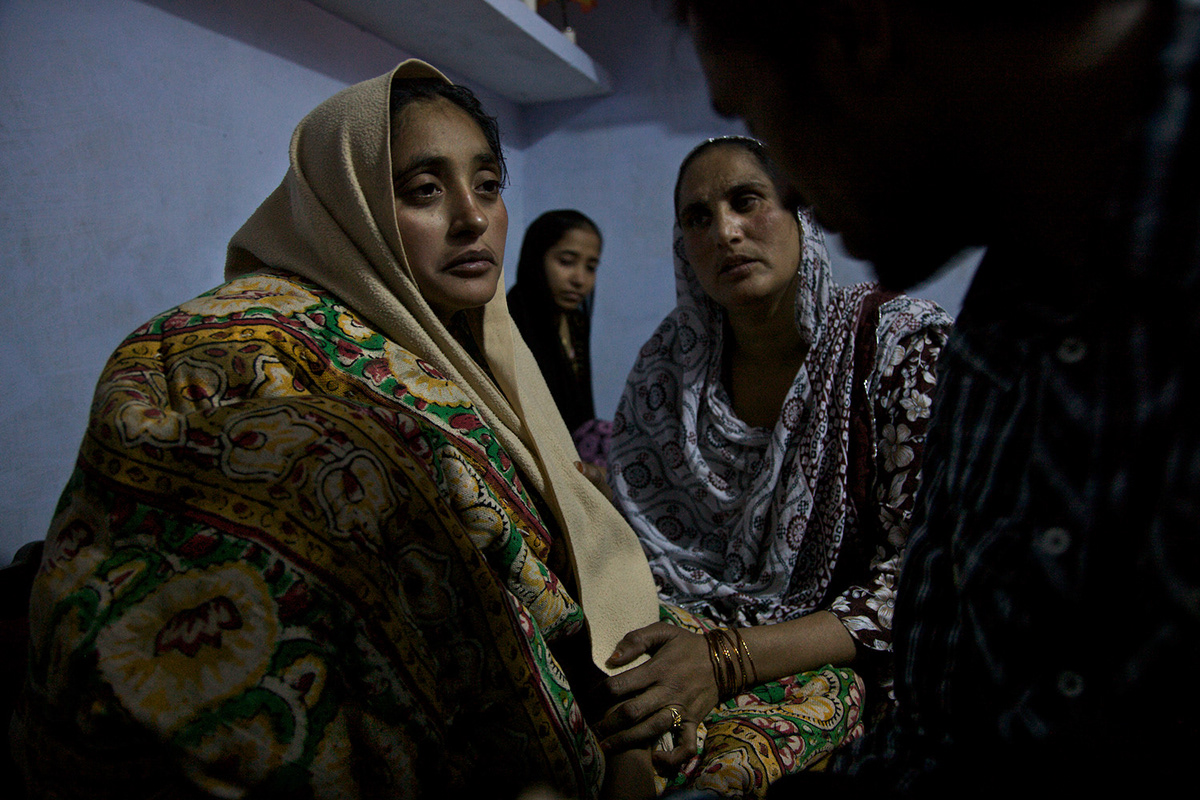REBELS OF LOVE
Delhi, Haryana, Uttar Pradesh - India - ( 2012 )
pictures: Zoe Vincenti text: Stefania Prandi
2012 © all rights reserved
There is a new generation of Indians that struggles in the name of love. They risk their lives in order to fulfill their dream of marrying the person they want. They run away from their families who, due to the social context, condemn their choices and try to hurt or kill them. They break with the traditional system of values and create a new order.
They fight against the caste - still present in India even though Gandhi declared it illegal - and a strict religious system, overcoming these formidable obstacles and following their hearts instead. There are no certain numbers concerning the size of this group because the government, considering them a danger rather than a resource, doesn't have an interest in supporting them.
This movement is particularly strong in some areas of northern India, in places such as Delhi, Rajasthan, Haryana and Uttar Pradesh, where the consequences of globalization and Indian economic development crash against the medieval structures of the society. The struggles of these people are hard: many of them are caught after their escape. Women are imprisoned in rooms where they are bitten and tortured by male family members (father, brothers, uncles, cousins) and forced to stay without food and water.
They are coerced into marrying men they don't love. If they refuse they are killed in a horrific way. The rage of the female’s families are also passed on to their lovers. If they are taken they are murdered. We documented the story of Abdul Hakim who was shot in November 2012 when he was 28. His fault was to marry the woman he loved, Mehwish, against the wishes of her family. There were no religious or caste problems: they were both Muslim and Jat.He left two daughters. Indian society calls this kind of murder “honor killing”.
There are no exact numbers dealing with this phenomenon; according to some estimates there are one thousand deaths every year, but for some organizations says there are ten times more. By reading newspapers it is really easy to notice this silent carnage due also to the inaction of theIndian government that hasn't yet approved a law against honor killing (in spite of civil society pressure).
The only protection for these “rebels of love” - as we called them - is in shelters which are developing in Delhi and Haryana, such as the Love Commandos (a group that offers protection to couples who face threats), or with the help of another association based in Haryana, called AIDWA ( all India democratic women association ). However, these places are not big enough to host every couple on the run.
Every day Love Commandos receives one hundred help requests but they don’t have the capacity to accept everyone. Moreover they don't offer help for free: they ask for money from these couples in order provide food and legal assistance. In November and December 2012 we were in Delhi, Haryana and Uttar Pradesh where we witnessed the lives of those “rebels of love”. We remained with them in the shelters and visited the rural areas where the opinion movement is scanty about this issue.
Love marriage, in fact, is still a taboo in the north of India, something accepted only in Bollywood films or religious tales. Due to the renouncement of their dreams of love, some of them lose their minds and commit suicide. Besides the shelters (in some regions), there are not any programs to support these people. Now the Indian media is starting to talk about them but not with the necessary intensity that this issue deserves. In fact, with love Indians could really overcome the caste system which is one of the main causes of poverty. More than 80% of the population lives with 20 rupees (less than half a dollar).

New Delhi, November 2012. Streets around the Love Commandos’ shelter.

one of the rooms of Love Commandos shelter.

Noorin, Rahul’s wife. They are from Uttar Pradesh. She is from a very strict Muslim family. She met Rahul when she was working in his same company. They fell in love but her family discovered her. She was imprisoned and lost her job. With the help of a friend she was able to escape from her house and meet Rahul so they could go to Delhi together. However her family is still looking for her and they want to kill her. Rahul is Hindu. Due to the anger of Noorin's family now she is desperate. In fact Noorin's relatives burnt Rahul’s house and his family disappeared. No one knows anything about them. Rahul is worried that they are all dead; in addition, he is in trouble because he is accused by Noorin's family of rape and kidnapping.

All the couples in the shelter, Delhi

Lekha e Hetal (21, from Uttar Pradesh) in the shelter. They are from very rich families that are opposing to their relationship.

Kanika (19) and Vasu (21) are from Uttar Pradesh. Since they are from the same clan (gotra), they were not allowed to marry. When Pooja's family discovered her love affair she was imprisoned, forced to abort (she was 3 months pregnant) and sold to a 40-year-old man who wanted to marry her. The day after the wedding Pooja jumped from the balcony of the husband's house and reached Kapil in Delhi. She wounded her head, legs and arm.

New Delhi, nov 2012. Noorin ( Muslim ) and Anubha ( Hindu ) are praying together

India stands as the fourth most dangerous country for women, trailing only behind Pakistan, Congo, and Afghanistan. Over 100 million women and girls are estimated to be involved in human trafficking, and 50 million girls are said to have gone “missing” throughout the past century due to female infanticide and feticide.According to the National Crime Records Bureau (NCRB), Delhi is now considered to be the “rape capital” of India, where 31.2% of crimes that occur are against women, which include rape, dowry killings, abduction and sex trafficking.

night view of Delhi

two guys asking for protection to Sanjoy Sachdev, Love Commandos' leader. Every day Love Commandos receives one hundred help requests but they don’t have the capacity to accept everyone.

Praval (26) and Saroja (20) are from Uttar Pradesh. Suhail is Muslim and he felt in love with Apoorva who is Hindu. They are also from different castes. She is from a very wealthy family that condemned their relationship; Suhail's parents also didn't approve of their marriage. Despite everything, they decided to marry and escape from their villages to find refuge with Love Commandos. Now they are leaving the shelter for their new life.

Abdul Hakim was shot in November 2012 when he was 28. His fault was to marry the woman he loved, Mehwish, against the wishes of her family. Mehwish's family killed him two years after their wedding. This is one of the thousand murders called HONOR KILLING.

Mehwish, Abdul’s widow during the funeral of her husband Abdul Hakim. After being threatened by the her family, at the beginning of their wedding they went to live in Love Commandos shelter. Bulandshahr, Uttar Pradesh

A Rohtak district, Haryana.

Young couple in Rohtak, Haryana.

A governmental shelter in Hisar, a village in Haryana.

A couple in the governmental shelter in Rothak, Haryana. Ashoke, 30, is Jat and Rity, 21, is Jimen: two different casts. They are here because their families don't accept their relationship. The married some days before.

Rity standing on the balcony of the protected area of the governmental shelter in Rothak, Haryana.

In Rohtak, Haryana. Jagmati Sangwan, president of AIDWA (All India Democratic Women's Association) and some activists are meeting women in the Haryana villages.

Rohtak, Haryana. Manoj and Mukesh the day of their wedding. They live in Rohtak. and married for love two years ago. They have been fighting against Mukesh's family for five years. Also, due to this situation, she developed a mental disease that is being treated with medicine.

New Delhi. Banquet hall in the temple. Preparing for a traditional wedding.

The number of love marriages is increasing in India. They represent around 25% of all marriages

New Delhi. A portrait of the city; in one of the several parks of Delhi, where couples are in the habit of taking refuge to find a bit of intimacy. In the rest of the city it is strictly forbidden to exchange even simple displays of affection in public.

Traditionally couples, after the wedding, return to live with the groom’s family.

A couple in Delhi, getting away to their new secret destination.

